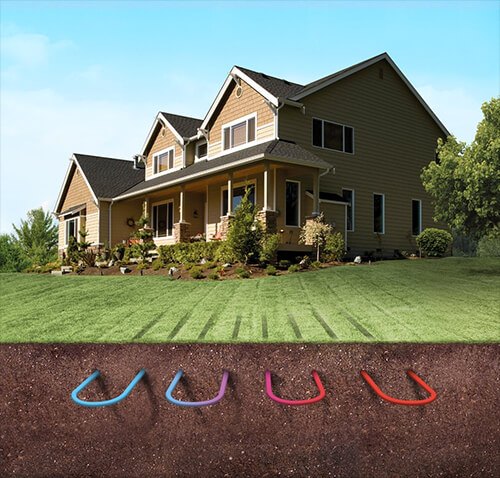By drawing warmth from the underground source, your heat source can’t run out. The temperatures below ground remain around 50 degrees.

Geothermal heating systems can provide reliable comfort during the coldest winters without causing spikes in your power consumption. These systems offer high efficiency, sustainability and durability. You won’t need to keep up with increasing fossil fuel prices or compromise comfort during winter to reduce your carbon footprint. Geothermal systems tap into a natural heat source available on your property.
Professional life cycle services and repairs are key to keeping these heating systems efficient over the years. With professional installation and maintenance from our expert geothermal contractors in Central Pennsylvania, sustainable heating systems can provide optimal performance from one season to the next.
Geothermal systems are designed to draw heat stored underground through water circulating in a looped pipe system. The geothermal heat pump systems carry the heat from the pipes to ground source heat pumps, where it is concentrated and sent to the home as warm air. These systems use ductwork to deliver warmth through vents.
Unlike traditional heat pumps that convert fuel into warmth, geothermal systems absorb warmth from the stable underground source beneath your home. Even when temperatures drop below freezing, the ground beneath your property will remain consistent, so these systems can provide stable temperatures throughout cold winters.
These residential heating systems also offer cost-efficiency when it comes to maintenance and repairs. While the ground loop piping can last for decades before repairs are necessary, life cycle maintenance needs are also minimal.
Geothermal heating systems offer an eco-friendly solution to keep indoor temperatures stable all year round. These systems deliver constant warmth during winter and can offer reliable cooling during summer. When you choose geothermal heat for your home, you can expect the following benefits:
By drawing warmth from the underground source, your heat source can’t run out. The temperatures below ground remain around 50 degrees.
Geothermal systems don’t use fossil fuels to generate warmth. These systems offer an eco-conscious way to stay warm throughout freezing winter months.
Investing in a sustainable heating system could reduce your utility costs by as much as 70% due to its energy efficiency. You can save on operational, maintenance and repair expenses with this sustainable system. Geothermal heaters are up to 600% more cost-efficient than most other traditional home heaters.

Geothermal installations are complex projects with several stages, from ground loop laying to ductwork replacement. Our geothermal system installers handle ground loop pipe construction and can replace the ductwork in your home before installing the heat pump and connecting electrical wiring. Our team of installation and repair technicians receive continuous training with these intricate systems.
Our company has been serving homeowners with geothermal and other heating needs in Pennsylvania since 1914, and our team of technicians has an average of 10 years of experience. We are fully insured and provide property protection assurance for our customers.

If you’re looking for the best geothermal installers in Central Pennsylvania, our technicians can assist. Our technicians specialize in residential geothermal heater installations, maintenance and geothermal repair. Our technicians provide 24-hour emergency response, so you won’t be left in the cold when you rely on us. As an employee-owned business, we provide superior work quality and unbiased recommendations. We’ll perform an accurate needs assessment to make recommendations that suit your home and budget.
Choose professional geothermal heating services and find flexible financing solutions with 0% interest to suit your budget. Contact us online to learn more about our residential heating services or request an appointment with our easy-to-use scheduling tool.